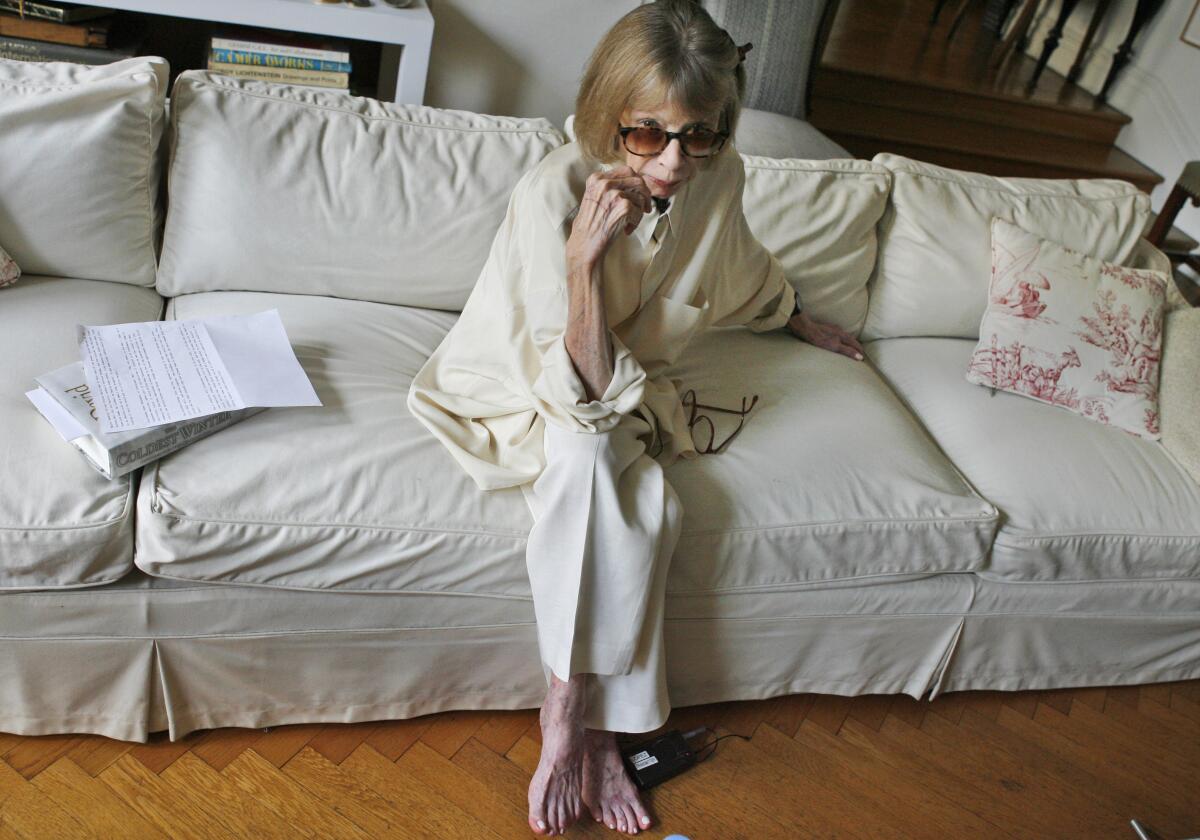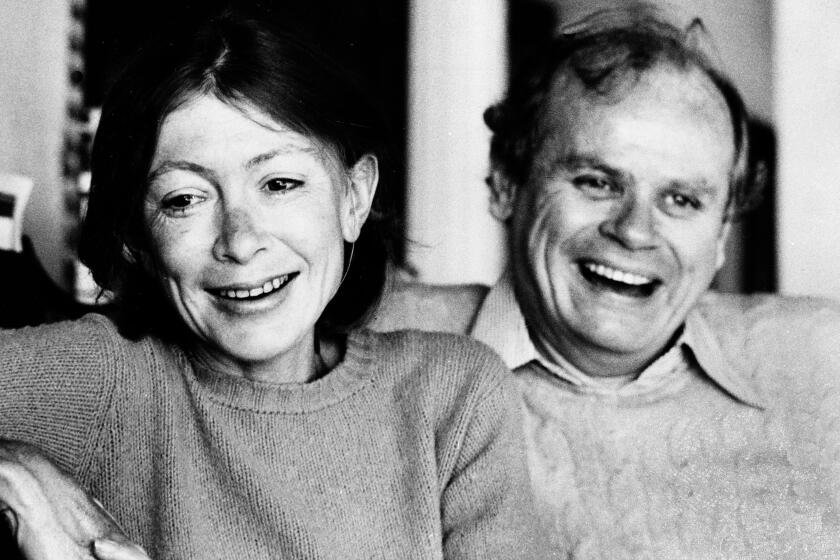Flowers for Didion: A California transplant says goodbye to her idol on a visit to New York

- Share via
The messages started coming in at noon, Eastern time. “Joan Didion died.” “Joan.” Heartbreak emojis. Instagram posts featuring the glamorous black-and-white portraits I can see with my eyes closed. A link to her obituary. California daughter Joan Didion, whose writings about her home state excavated and formed some of its most indelible myths, had died at her home in New York City. She and her husband, John Gregory Dunne, returned here from Los Angeles in 1988, two decades after she wrote the legendary kiss-off “Goodbye to All That,” which opens, “It’s easy to see the beginning of things, and harder to see the ends.” She was nothing if not committed to new beginnings, but New York is where it ended.
I didn’t know Didion personally, but I followed her example in more ways than one, a New Yorker and a journalist summoned west by the pictures she’d painted of a Golden Land, by the transformational energies she had mined, even — or was it especially? — from the darkest places. Didion wanted to know what happened when we left the past behind; there was always a cost, but sometimes it was worth it. This potentiality that vibrates throughout her writing eventually became the theme of a collection of essays I edited, “Slouching Towards Los Angeles” — a project that intimately revealed the part she played in helping other writers like me, mostly women, to hone their voices and define their places in the world.
The Didion devotee will always feel in some way indebted. I’d said my own “goodbye to all that” 16 years ago, when I packed up my Brooklyn apartment and bought a one-way ticket to L.A., but I have always (except in 2020) celebrated the holidays with my family in New York. So it happened that I found myself walking across Central Park on a cold December afternoon, two days before Christmas, heading to Joan Didion’s apartment building because I couldn’t think of another way to grieve this woman, this stranger, this trusted guide.
Joan Didion, who died Thursday, left a seismic impact on the literary world and her home state of California.
Didion herself helped so many to contend with grief through her tragically twinned memoirs, “The Year of Magical Thinking” (2005) and “Blue Nights” (2011), which were the last two books of new writing she published. In her final years, Parkinson’s disease made it difficult for Didion to see and speak, much less write. She came to embody grief, and during this particularly grim holiday season she is its subject.
Although Didion’s prose has a gem-like precision, her narratives emanate from the mess of living. The inverse of leaving the past behind is going home again. I think Didion was drawn back to California in the 1960s not out of homesickness for a tidy childhood, but because she recognized it as a nexus of revolution. The subjects she returned to still resonate today: the inspiring yet naïve idealism of the hippie movement, the sinister decadence and transcendence of Hollywood and rock ‘n’ roll, the righteous might and errant energies of the radical left. I don’t think Didion went to Haight-Ashbury looking to expose the perils of psychedelics or the sham of the Summer of Love; she went because she saw a movement with the potential to shift society. Its failure didn’t give her pleasure; in fact, it might have broken her heart.
After vowing never to leave California, the Didion-Dunnes found that things had grown “stale” in Los Angeles, as they told a writer for The Times when she visited their new digs on Manhattan’s Upper East Side. In truth, this coveted and buttoned-up neighborhood was essentially the New York equivalent of Brentwood — where they had apparently received an offer on their house that they couldn’t refuse — but it was worlds away from Malibu or the seedy, storied glamour of the couple’s home on Franklin Avenue. This was the apartment where Dunne would collapse from a fatal heart attack in 2003, leaving Didion’s life changed forever “in the instant,” as she wrote. And now it was where she too had taken her last breath.
Christine Lennon, Su Wu and others contribute essays to a collection on the master essayist
Approaching the building, a classic pre-war construction just off Madison Avenue and across the street from a church, I expected to find … something. Piles of flowers, maybe, or small clusters of people gathering, votives burning, books left as offerings. I did not expect to walk up a quiet, empty street dotted with bare trees, to find an elegant building whose tranquility was almost offensive. The world behind its shiny black doors had changed forever, in the instant, but its façade was impenetrable. In retrospect, I shouldn’t have been surprised: Public scenes of any sort are frowned upon, if not forbidden, in this part of town. It’s what residents pay good money for — maybe even the Didion-Dunnes.
I went up to the building, carrying a bouquet I’d bought at a nearby market. “Is it OK to leave flowers for Joan Didion?” I asked the doorman. “You can leave them at the service entrance around the corner,” he told me. “Somebody will take them.” But I did not want them to be swept politely out of sight. I wanted these flowers to mark the place where a great writer had lived and died, a small sign for others who might be walking these same staid streets, looking for a way to grieve.
And then, while I lingered on the sidewalk just out of view of the doorman, unsure what to do but unable to leave, a long-haired young punk in a leather motorcycle jacket and combat boots came striding up, holding a lush bouquet of white roses tied with a green ribbon. I watched as he wordlessly, almost without slowing down, laid the roses at the base of a potted tree outside the building. Never making eye contact, he continued down the street and disappeared. Taking that as my sign, I walked back to the entrance and left my own bouquet of roses for Joan, the petals flame-orange with yellow centers and pink-dipped edges, just like a California sunset.
Ava DuVernay, Roxane Gay, Jessica Chastain and Gov. Gavin Newsom are among admirers paying tribute to writer Joan Didion, who died Thursday at age 87.
Nelson is a writer and the editor of “Slouching Towards Los Angeles: Living and Writing by Joan Didion’s Light.”
More to Read
Sign up for our Book Club newsletter
Get the latest news, events and more from the Los Angeles Times Book Club, and help us get L.A. reading and talking.
You may occasionally receive promotional content from the Los Angeles Times.








